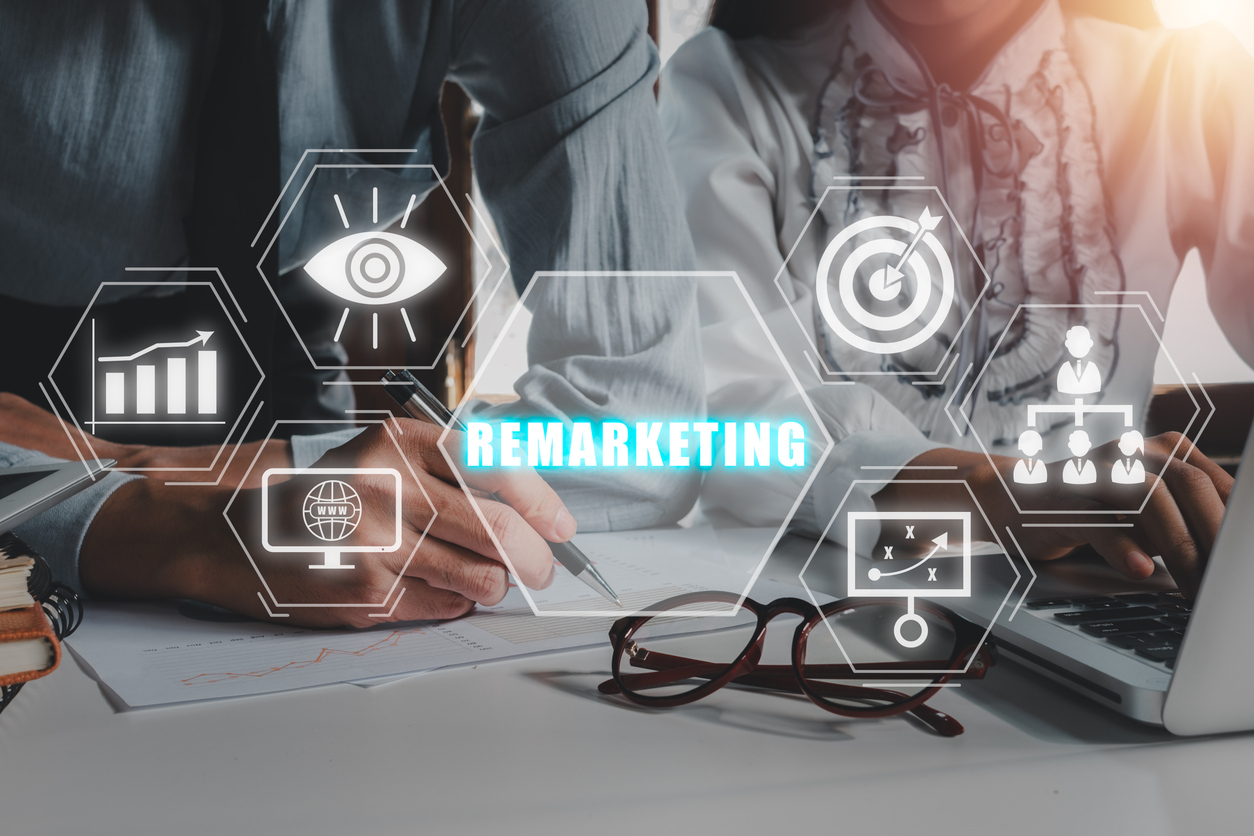 GET STARTED
GET STARTED 
Whether you sell a product or offer a service, not every potential customer is ready to make a conversion when they land on your site. You will get visitors in various stages of the buyer’s journey, and that’s ok! Just because a visitor is not ready to make a purchase as soon as they find your business online, that doesn't necessarily mean that you’ve lost that customer forever! Through the power of remarketing, you can coax those customers back to you and convert them into happy first-time customers, and even happier repeat customers! To talk about a remarketing strategy that is right for you, call our local small business digital marketing agency today!
First things first, let's clear up what we mean by "remarketing." It's a strategy that involves targeting people who have already interacted with your brand in some way. Maybe they visited your website, added something to their cart but didn't complete the purchase, or maybe they're past customers who haven't engaged with you in a while.
The idea is to remind these folks about your awesomeness and nudge them toward making another purchase or taking some other desired action, like filling out a form.
While “remarketing” and “retargeting” are often used interchangeably in the digital marketing landscape, there are some subtle differences between the two to keep in mind. Both strategies aim to re-engage potential customers that have already interacted with you. The differences lie in the target audience, methods and platforms used to accomplish this.

Retargeting is primarily ad-based, focusing on serving ads to potential customers as they browse other websites or social media platforms. It typically uses third-party networks like Google Display Network or Facebook to serve their ads. A local small business digital marketing agency knows the ins and outs of these platforms, and how to maximize your budget. Retargeting uses behavioural triggers, such as visiting a particular page, or viewing a certain product.
Retargeting is helpful for converting those who were not ready to buy when they first interacted with your business online. Maybe they saw your ad while scrolling social media and your product intrigued them, but for whatever reason, it wasn’t the right time for them to make a purchase. Through the power of retargeting though, your ad will continue to be served to them as they scroll their preferred social platform, reminding them of the great product they didn’t buy… yet. The goal is to re-attract these people to your website and convert them from window shoppers to happy customers.
Remarketing has a deeper focus on personalization and customer retention. It’s primarily email focused. This is where you use personalized emails with offers to reattract previous buyers to turn them into repeat buyers. Consider cleaning out your email inbox every day – you may receive 100 emails from your favourite store that you ignore, but when the time is right you will engage with the email to see if there is an offer you can leverage to save money on your favourite stuff! This is remarketing in action.
You've probably heard the saying that it's cheaper to keep a customer than to acquire a new one. Well, it's true. Studies have shown that the cost of acquiring a new customer can be five times more than retaining an existing one. Remarketing allows you to capitalize on this by targeting a group of people who are already familiar with your brand, making them more likely to convert. With remarketing ads, you are reattracting people that you have already marketed to. In the buyer’s journey timing is everything! Maybe they initially found you when they were in their research phase, but it takes a couple weeks before they are ready to make a purchase. You need a way to re-attract these people so you can harness maximum sales from all of your marketing efforts, instead of constantly burning your budget on only acquiring new customers. Just because they weren’t ready to make a purchase then doesn’t necessarily mean that they won’t!

People who have already bought from you are more likely to do so again. They're familiar with your products, they trust your brand, and they've had a positive experience with you before. Also, consider those that have already interacted with an ad but weren’t ready to buy at the time of their first interaction with your brand. you are giving them a chance to re-engage and convert sales/leads that may have been lost without remarketing ads. All of this adds up to higher conversion rates when you target these individuals with remarketing campaigns.
Remarketing allows for a high level of personalization. You can segment your audience based on their past behavior and tailor your messaging accordingly. Did someone abandon their cart? Remind them to complete their purchase and maybe offer a small discount as an incentive. Has a customer not made a purchase in a while? Show them what's new and exciting in your inventory. Did they spend quite a bit of time looking at specific products on your website? Show them those products while they search online to remind them of these awesome products.

The first step in any remarketing campaign is to identify who you're targeting. Are they past customers, website visitors, or people who engaged with your social media? Knowing this will help you choose the right remarketing tactic, whether it be ads or email, and tailor your messaging to them. A local small business digital marketing agency can help you pinpoint your audience.
You can run remarketing campaigns on various platforms like Google Ads, Facebook, Instagram, and more. Choose the one that aligns best with where your audience hangs out online. If you are more interested in remarketing to your existing customers, you will need to find a CASL compliant email marketing platform to create personalization logic, craft beautiful emails, and manage consent.
Remember, the key to successful remarketing is personalization. Make sure your messaging speaks directly to the individual's past experience with your brand.
Like any marketing campaign, it's crucial to monitor your results and adjust as needed. Keep an eye on metrics like click-through rates and conversions to gauge the effectiveness of your campaign. A local small business digital marketing agency will be able to expertly track and analyze your campaign, taking out all of the guess work and helping you make the most of your marketing budget.

Remarketing is cost-effective, yields higher conversion rates, and allows for a high level of personalization. Keep your brand top of mind for those customers who just aren’t quite ready to make their purchase, and they will be! Better yet, remarketing draws them back in to be the happy repeat customers that your business needs to thrive. To build your ideal remarketing strategy, contact Smart WSI Marketing, your local small business digital marketing agency, today!



